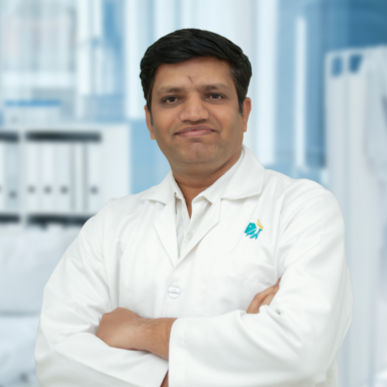Congenital Heart Disease Treatment
Explore a comprehensive guide to congenital heart disease treatment, including various types of heart defects, available diagnostic methods, treatment options, and ongoing care strategies to help manage and improve the health of individuals with congenital heart conditions.

Written by Dr Sonia Bhatt
Last updated on 13th Jan, 2026
Congenital heart disease (CHD) is defined as the anomalies of the heart that are inherent soon after birth. These defects span the mildest abnormalities–tiny openings in the heart walls–to the more extreme–abnormalities that heavily impair the blood flow. Congenital heart disease affects nearly 1% of newborns, and is therefore best addressed by awareness and early treatment.
CHD, like other diseases, has multiple factors that lead to the disease. These factors can either be classified as genetic as well as environmental factors. A history of heart disease in the family or children with genetic mutation or chromosomal abnormalities are also at high risk of developing CHD. Some other factors that may play a role in the development of this disease also include maternal infections such as rubella, diabetes, or toxicity during pregnancy.
Diagnosis of Congenital Heart Disease
Accurate identification of CHD is one of the key components in controlling the condition. Congenital heart disease can be identified before birth through fetal scans or newborn screening. All paediatricians have to do is listen to the heart and note any abnormality, such as murmurs or irregular fetal heart rate. The need to identify these early and act on them makes it possible to attain much better results.
Key diagnostic tools include:
Echocardiography: Grants real-time images of the heart by using sound waves and provides information on structural abnormalities or blood flow.
Cardiac Catheterisation: Also called coronary angiography, involves passing a catheter through blood vessels to the heart to get detailed evaluations of structures and pressures.
Advanced Imaging Techniques: MRI and CT scans have a high utility in representing intricate defects and operative strategies.
Pulse Oximetry: A basic non-stressful examination used in newborn children to determine levels of oxygen in the blood that may suggest signs of possible heart complications.
It is noteworthy that prompt diagnosis at birth in patients with CHD significantly optimizes outcomes and quality of life. Early diagnosis of CHD means that a child who has these risk factors can be cared for before defects like delayed growth injure other organs or the heart.
Treatment Options for Congenital Heart Disease
The treatment of CHD depends on the type and severity of the defect. Advances in medical science have led to a variety of treatment modalities:
Medical Management: Drug use is the foremost approach to minor defects. According to experts in the field, diuretics reduce fluid accumulation and prevent clots from forming by diluting the blood. Beta-blockers and ACE inhibitors enhance the heart’s performance and circulation.
Surgical Interventions: Evaluating and treating complex congenital heart disease usually involves opening the patient’s chest and fixing the heart problems. The procedures may include valve combustions, valve replacements, septum defects, or arterial switch procedures. The type of surgery depends on the state of the patient.
Catheter-Based Procedures: Balloon angioplasty and device closure are practices that have changed the way doctors approach CHD treatment. These procedures are less invasive and, hence, quicker than traditional surgery and have better outcomes than surgery.
Heart Transplantation: If heart repair is not possible, a heart transplant may be the only available option. Transplant patients need to take medicine for the rest of their lives in order to stop their bodies from rejecting the organs.
Consult Top Doctors For Congenital Heart Disease
Post-Treatment Care and Monitoring
The journey doesn’t end with treatment. Lifelong care is essential for CHD patients to ensure sustained health and prevent complications. Regular follow-ups with a cardiologist are crucial to monitor heart function and detect potential issues early.
Adopting heart-healthy lifestyle practices, such as maintaining a balanced diet, engaging in appropriate physical activities, and avoiding smoking, is vital. Equally important is addressing the emotional and psychological aspects. Many patients and families benefit from counselling and support groups to navigate the challenges of living with CHD.
Complications and Risks Associated with Treatment
Nowadays, there are a range of treatment methods for congenital heart disease, but each method has its own risks and dangers, which must be taken into account. Some short-term risks are postoperative infections, postoperative bleeding, and complications resulting from anaesthesia. These risks are brought about by the complexity of heart surgeries and operations, especially for children below an age when their bodies are most likely to be tender and new.
Long-term complications depend mostly on the type of defect and the applied therapy. For instance, potential complications can include rhythm disorders like arrhythmias, heart failure, and, for those who undergo valve replacements, issues related to prosthetic valves. Additionally, patients may face the possibility of needing repeated procedures or surgeries as they age and their cardiovascular system continues to evolve.
These risks can be managed, beginning with true collaboration between surgeons, radiological oncologists, medical physicists, and medical engineers. Current advancements in medical technology also effortlessly contribute to improving safety and results.
Role of Genetics and Family Planning
Genetics plays a significant role in the recurrence of CHD within families. Genetic counselling provides valuable insights into the likelihood of passing on congenital defects. Families with a history of CHD can make informed decisions about pregnancy and prenatal testing options.
Advances in genetic screening and counselling empower families to understand and manage the risks associated with CHD, ensuring better preparedness.
Advances in Treatment Techniques
Technological advancement in CHD has significantly increased the survival rate and quality of life among those affected by the disease. Some of the examples are developing 3D printing technology for better understanding during surgery and other minimally invasive surgeries that are a complete revolution. Novel interventions also include Gene therapies and Stem cells to prevent or treat various forms of CHD.
The prospect of CHD treatment keeps developing due to the further exploration of the application of artificial intelligence for earlier diagnosis and continuous monitoring of patients. Such progress is expected to revolutionise traditional patient care and bring it to a new level of uniqueness.
Patient and Family Education
Education is an important notion in managing CHD. Patient and family education increases individuals’ ability to make effective decisions, as well as to follow treatment regimens. It should be noted that accumulating information and educational materials, along with attending workshops under authorised professionals can be especially helpful.
Living with Congenital Heart Disease
To many individuals, CHD is a chronic condition that entails the need to live with it throughout the lifespan and cope with it. Thanks to the development in the medical field, many patients are able to lead satisfactory lives. They are working, studying, having their own careers, and fulfilling lives.
There is still a lot we can do, but a positive attitude accompanied by good medical care and support structures helps the patient to survive.
Conclusion
Of all cardiovascular diseases, congenital heart diseases are the most medically complex. However, significant progress in CHD diagnosis, treatment, and congenital care has made it a manageable disease. As we focus on early detection and new techniques in the treatment process, all these steps will lead to better patient outcomes.
But for those diagnosed with CHD—hope is never lost. More research, better and more humane treatment endeavours, as well as psychosocial support can be the key to a healthy, better future. In this case, families and patients are comforted knowing they are not alone in this fight.
Consult Top Cardiologis
Consult Top Doctors For Congenital Heart Disease

Dr. Arulnidhi Ayyanathan
Cardiologist
12 Years • MBBS, MRCP, AB, MBA
Chennai
Apollo Hospitals Greams Road, Chennai

Dr. Vignesh Thanikgaivasan
Cardiologist
11 Years • MBBS, MD (Gen Med), DM (Cardiology) AFAPSIC, FIMSA, FSCAI
Chennai
Apollo Hospitals Greams Road, Chennai
(100+ Patients)
Dr. Srinivasa Prasad B V
Cardiologist
23 Years • MBBS, MD, DM (Cardiology). Fellowship in Interventional Cardiology (post DM), FSCAI Structural Heart Interventions Training (Buffalo University, New York)
Bengaluru
Apollo Hospitals Jayanagar, Bengaluru
Dr. Chandra Kumar Singh
Cardiologist
5 Years • DM CARDIOLOGY
Bhopal
Apollo Sage Hospitals, Bhopal

Dr. Prashant Adeppa
Cardiologist
10 Years • MBBS, MD General Medicine, DM Cardiology (Armed Forces Medical College)
Bengaluru
Apollo Hospitals Bannerghatta Road, Bengaluru
Consult Top Cardiologis

Dr. Arulnidhi Ayyanathan
Cardiologist
12 Years • MBBS, MRCP, AB, MBA
Chennai
Apollo Hospitals Greams Road, Chennai

Dr. Vignesh Thanikgaivasan
Cardiologist
11 Years • MBBS, MD (Gen Med), DM (Cardiology) AFAPSIC, FIMSA, FSCAI
Chennai
Apollo Hospitals Greams Road, Chennai
(100+ Patients)
Dr. Srinivasa Prasad B V
Cardiologist
23 Years • MBBS, MD, DM (Cardiology). Fellowship in Interventional Cardiology (post DM), FSCAI Structural Heart Interventions Training (Buffalo University, New York)
Bengaluru
Apollo Hospitals Jayanagar, Bengaluru
Dr. Chandra Kumar Singh
Cardiologist
5 Years • DM CARDIOLOGY
Bhopal
Apollo Sage Hospitals, Bhopal

Dr. Prashant Adeppa
Cardiologist
10 Years • MBBS, MD General Medicine, DM Cardiology (Armed Forces Medical College)
Bengaluru
Apollo Hospitals Bannerghatta Road, Bengaluru



